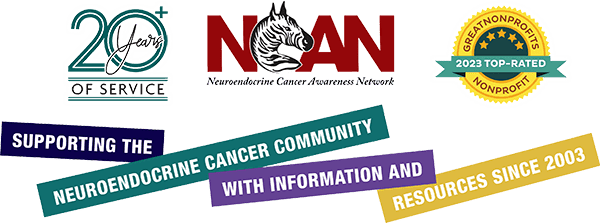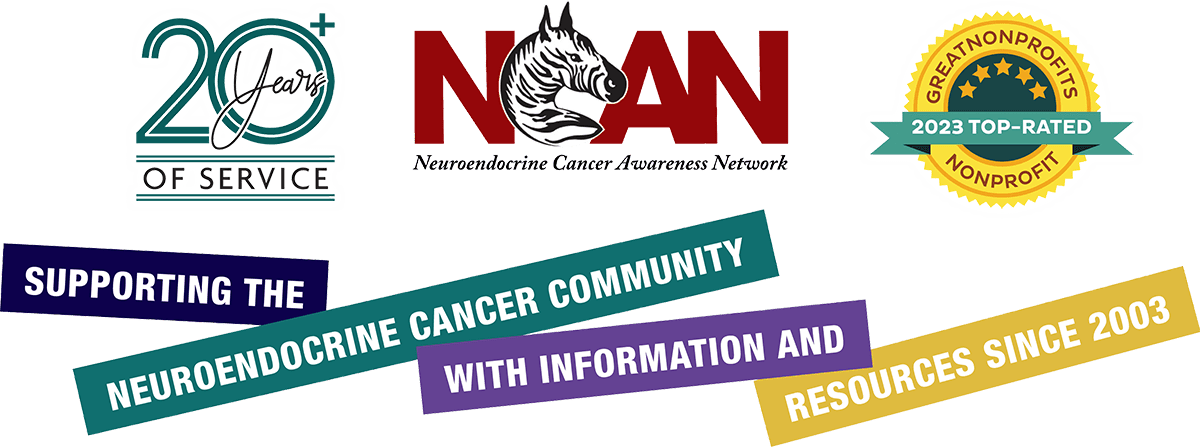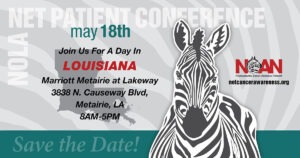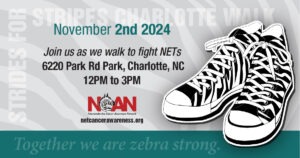May 1, 2024
By Anne Dabbs,
NCAN TN Support Group Leader, NET Patient

Online support groups are an asset for so many in our Neuroendocrine Cancer Community. Most of us have exclaimed more than once “I never heard of NET Cancer until I was diagnosed with it!” Another common refrain is that many of our physicians’ knowledge about our disease is outdated and limited. No wonder that so many NETs patients embrace the opportunity to communicate with one another. But, for this means of communication to be beneficial for all, we need to recognize a few basic understandings.
Facts are not opinions.
Opinions are not facts.
Every Net Specialist I have spoken to agrees that Neuroendocrine Cancer is heterogeneous. The dictionary tells us that means diverse in character or content. Just as a zebra’s stripes are its biomarker, our disease is different and unique to each one of us.
Net Cancer is not one size fits all. My experience and your experience can be worlds apart in diagnosis, treatments, and prognosis, but we are both net cancer patients. What has worked for me, and my situation may be totally inappropriate for you.
I believe to be a good advocate for yourself, you must also be familiar with the larger scope of NETs, and not just your own individual experiences. I also firmly believe that if you wish to be active in helping other patients by participating in online discussions, you must also be aware of the differences in addition to the similarities of our disease. I do not believe that my fellow NETs patients ever intend to give poor advice, but oftentimes, incomplete, or misdirected advice pops up in our groups.
How can we improve the quality of our exchanges? As patients, we must acknowledge that we are sharing our anecdotal experiences with one another. The details of one patient’s situation may not be true, reliable, or relevant to another’s experience. We can offer suggestions and opinions based on our experiences, but actual advice is best left to our physicians, researchers, and specialists.
I have found that the best conversations among patients include awareness of similar primary sites or grade values. It is beneficial to clarify that you understand what the poster is truly asking and don’t make assumptions without first checking the original post.
Offer suggestions instead of directives by phrasing your reply: “You may not be familiar with this treatment, but what about…?” Or, “I ‘m just wondering if you and your physicians have considered this…?” Another way to make sure your information is heard can be phrased “Without knowing all of the important details, but have you considered…?”
One of the greatest benefits of online conversations is that we have a safe place to vent about the frustrations of living with an incurable, variable disease. For some, this opportunity is the greatest benefit. “I want to make sure you realize that you are being heard, I cannot share a similar experience, but I feel your angst.” “One time I was experiencing something very similar to yours and this is what helped me”. Or even the powerful acknowledgment: “Are you wanting to vent right now or are you open to advice about this situation? I can do either. Just tell me how to help.”
If, by chance your contribution to the conversation is met with defensive replies, try to make a repair by saying “perhaps we have a misunderstanding. Did I miss an important detail? Did I make a wrong assumption? Are you feeling unheard or misunderstood?” And, please, if you are corrected by another, politely ask for a reference for their statement and thank them for wanting to help you.
Hopefully, these suggestions will assist in having more productive conversations with one another. A quick self-check that you are framing your dialogue as anecdotal experiences or facts that you can cite a resource will go a long way in making respectful comments. Kindness and compassion are hopefully our guides. We need one another. We need additional conversations. Together, with the support of NCAN and our community, we can continue to uplift and empower each other on our path to resilience and healing. Zebra Strong!
And as always, we are HERE for you if you need us.
Find out more about how YOU can help the NET Community.
Disclaimer: NCAN blog posts are the opinions of its writers and are not intended as a replacement for medical advice. Please consult your Health Care Providers for individual concerns.










Recent Comments